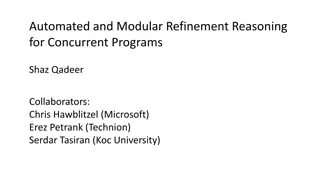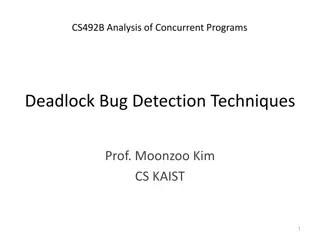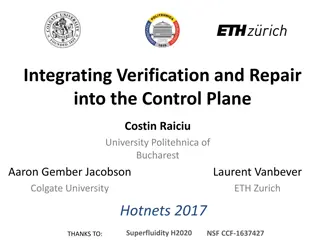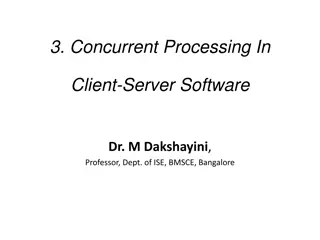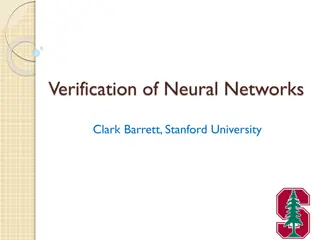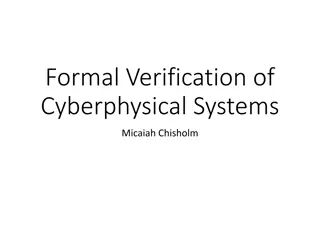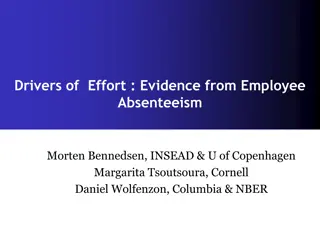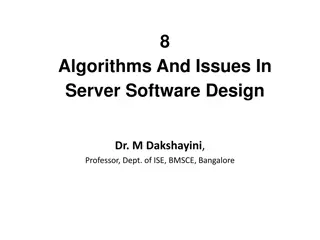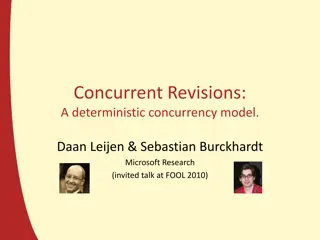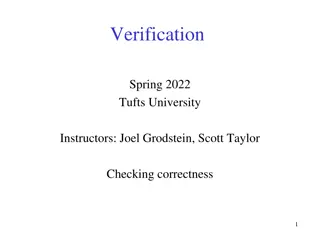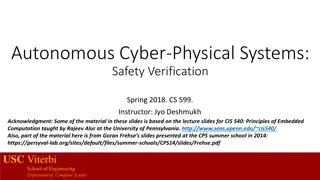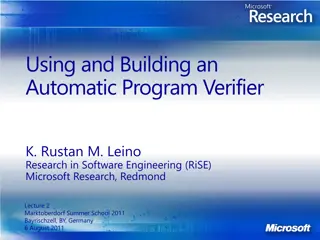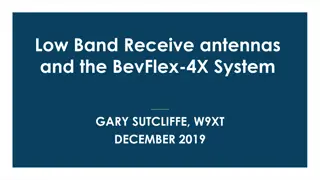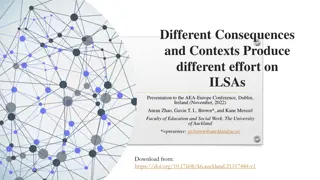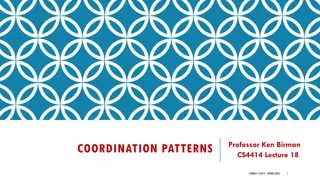Armada: Low-Effort Verification of High-Performance Concurrent Programs
Armada is a library that enables developers to write high-performance concurrent code with flexibility. It supports automated proof generation for reasoning about state machines and synchronization mechanisms. The tool reduces the proof burden by using a weak-consistency memory model and provides guidance for sound correctness proofs. Armada allows for the development of lock-free data structures and blocks of code that can't be interrupted by other threads.
Download Presentation

Please find below an Image/Link to download the presentation.
The content on the website is provided AS IS for your information and personal use only. It may not be sold, licensed, or shared on other websites without obtaining consent from the author. Download presentation by click this link. If you encounter any issues during the download, it is possible that the publisher has removed the file from their server.
E N D
Presentation Transcript
Armada: Low-Effort Verification of High-Performance Concurrent Programs Library of theorems for reasoning about state machines stdlib Generate state machines and Dafny proofs P.dfy Dafny Armada compiler P.arm CompCert TSO P.c Generate code Xueyuan Zhao Carnegie Mellon Univ. Yixuan Chen Univ. of Michigan and Yale Univ. Upamanyu Sharma Univ. of Michigan Jacob R. Lorch Microsoft Research Manos Kapritsos Univ. of Michigan Bryan Parno Carnegie Mellon Univ. Shaz Qadeer Calibra James R. Wilcox Certora
benign race (read of global variable without holding lock) Armada goals Give developers flexibility in code writing if (my_guess < best_guess) { lock(&mutex); if (my_guess < best_guess) { best_guess := my_guess; best_sol := my_sol; } unlock(&mutex); } developer guidance enables high-performance code Allows proofs about any code structure Supports arbitrary synchronization mechanisms, as in lock-free data-structure libraries Our tool generates most of the proof automatically, using Use realistic weak-consistency memory model (x86 s total store order, i.e., x86-TSO) Reduce developer proof burden with automation Ensure soundness of correctness proofs
Overview of Armada usage Implementation Specification method main() { var s:Solution; somehow modifies s ensures valid_sol(s); print_sol(s); } method worker() { ... if (my_guess < best_guess) { lock(&mutex); if (my_guess < best_guess) { best_guess := my_guess; best_sol := my_sol; } unlock(&mutex); } } For human appraisal To be compiled and executed method main() { ... create_thread worker(); ... }
Overview of Armada usage Implementation Specification method main() { var s:Solution; somehow modifies s ensures valid_sol(s); print_sol(s); } method worker() { ... if (my_guess < best_guess) { Language has features useful for high-performance, concurrent code lock(&mutex); if (my_guess < best_guess) { best_guess := my_guess; best_sol := my_sol; } unlock(&mutex); } } var p:ptr<int32>; struct S1 { var x:int32[4]; var y:uint32[8]; var s:S2; } method main() { ... create_thread worker(); ... } tid := create_thread worker();
Overview of Armada usage Non-compilable features are usable in specs Implementation Specification method main() { var s:Solution; somehow modifies s ensures valid_sol(s); print_sol(s); } method worker() { ... if (my_guess < best_guess) { lock(&mutex); if (my_guess < best_guess) { best_guess := my_guess; best_sol := my_sol; } unlock(&mutex); } } atomic { x := 3; y := 4; } Blocks of code that can t be interrupted by other threads, which hardware can t enforce memory accesses, even though CPU uses x86-TSO Unbounded-size integers and infinite sets, even though they can t be compiled var s:iset<int> := iset n | true :: n * n; method main() { ... create_thread worker(); ... } x ::= 3; /* immediately visible to all */ Sequentially-consistent
Overview of Armada usage Implementation Specification method main() { var s:Solution; somehow modifies s ensures valid_sol(s); print_sol(s); } method worker() { ... if (my_guess < best_guess) { lock(&mutex); if (my_guess < best_guess) { best_guess := my_guess; best_sol := my_sol; } unlock(&mutex); } } method main() { ... create_thread worker(); ... }
Proofs take the form of refinement levels level Spec { var s:Solution; somehow modifies s ensures valid_sol(s); print_sol(s); } level AtomicUpdate { ... atomic { if (*) { if (my_guess < best_guess) { best_guess := my_guess; best_sol := my_sol; } } } ... } But, the developer needs to write the levels and provide other guidance like invariants. level HiddenMutex { ... if (*) { atomic { if (my_guess < best_guess) { best_guess := my_guess; best_sol := my_sol; } } } ... } level AtomicCriticalSection { ... if (*) { atomic { lock(&mutex); if (my_guess < best_guess) { best_guess := my_guess; best_sol := my_sol; } unlock(&mutex); } } ... level ArbitraryGuard { ... if (*) { lock(&mutex); if (my_guess < best_guess) { best_guess := my_guess; best_sol := my_sol; } unlock(&mutex); } ... } } level Implementation { ... if (my_guess < best_guess) { lock(&mutex); if (my_guess < best_guess) { best_guess := my_guess; best_sol := my_sol; } unlock(&mutex); } ... } The proofs are generated mostly automatically. Intermediate levels can use the full specification language, since they re not compiled
Each pair of levels represents a program transformation level n+1 { ... } Transformation should be simple enough to automatically generate a proof level n { ... }
Example of program transformation: weakening level A { level B { method worker() { if (my_guess < best_guess) { lock(&mutex); if (my_guess < best_guess) { best_guess := my_guess; best_sol := my_sol; } unlock(&mutex); } } method worker() { if (*) { lock(&mutex); if (my_guess < best_guess) { best_guess := my_guess; best_sol := my_sol; } unlock(&mutex); } } proof AB { refinement A B starweakening } } }
Armada supports a variety of transformations weakening variable introduction variable hiding TSO elimination reduction rely-guarantee and more to come! if (my_guess < best_guess) var ghost_x:int; y := 4; var x:int32; x := 3; var x:int32; x ::= 3; var ghost_x:int; MakeXThree(); atomic { x := 3; var x:int32; x := 3; MakeXThree(); if (*) var ghost_x:int; assume x == 3; y := 4; }
Armadas semantic extensibility is sound Generated proofs are checked by verifier So, generation tools aren t part of the TCB Can incorporate new proof-generation techniques without worrying if they re valid For instance, if our rely-guarantee approach were unsound, proofs it generated would fail Levels and other developer guidance Proof generator Verifier Proof
Proof customization A failing proof gives developer feedback on what s wrong with their reasoning or about what proof-specific arguments they need to make level A { level B { method cos2sin2(r:real) { label lb1: g := cos(r) * cos(r) + sin(r) * sin(r); } method cos2sin2(r:real) { g := 1; } } }
Compilation Armada language close enough to C that translation is straightforward Translation to ClightTSO subset of C, and subsequent compilation with CompCertTSO, preserves assumed TSO semantics To estimate performance with a future, better-optimized verified compiler, we can unsoundly compile with gcc
Examples demonstrate Armadas utility Barrier Supports programs not amenable to ownership-based proofs Pointers Can generate proof using automatic alias analysis Mellor-Crummey and Scott (MCS) lock Supports high-performance custom synchronization code Automation reduces developer-written proof by ~90% compared to CertiKOS Queue from liblfds Lock-free Allows port of high-performance data-structure library
Performance of queue implementations Using % 0x10000 instead of & 0xFFFF reduces performance 16 High performance even when using CompCertTSO compiler for soundness Porting to Armada loses virtually no performance (not a fundamental limitation) 14 Throughput (Mops/s) 12 10 8 6 4 2 0
Future work Reduce trusted computing base Support memory models besides x86-TSO Use layers for modularity Model infinite behaviors to prove liveness properties Watch and contribute! https://github.com/microsoft/armada
Conclusions Armada methodology proves correctness of concurrent programs and permits whatever developer wants for high performance Developer writes proof outline as succession of program abstractions Extensible tool uses developer hints to generate refinement proofs If proof succeeds, compiled code will satisfy spec If proof fails, developer can see how to fix it Code @ https://github.com/microsoft/armada


